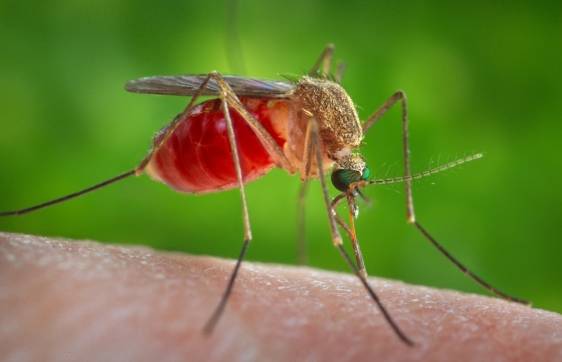
MANCHESTER, NH – As school athletics ramp up and many families are spending more time outdoors enjoying hiking trails and other activities, the city Health Department on Wednesday sent out a notice that West Nile Virus had been detected in a batch of mosquitoes collected in Manchester on Aug 15 and again on Aug. 22.
“These are the second and third detections in Manchester this summer,” according to the memo.
In accordance with the NH Department of Health and Human Service’s Arboviral Illness, Surveillance, Prevention and Response Plan1 the local risk level has been raised to “moderate.”
Anna Thomas, MPH, Manchester’s Public Health Director, said residents should continue to protect themselves when participating in planned activities outdoor.
“We want to remind all of the residents of Manchester and neighboring communities to continue to take steps to prevent being bitten by mosquitoes and to eliminate standing water on their property. A personal protective measure, like using an effective mosquito repellent, is the single most effective way to minimize risk.
This link to EPA-evaluated repellents are deemed most effective against mosquitoes.

From the memo:
Every summer/fall since 2000, the City of Manchester Health Department has been collecting and sorting mosquitoes which are then tested by the NH Public Health Laboratory for WNV, Eastern Equine Encephalitis (EEE) and Jamestown Canyon Virus (JCV). This information is helpful in determining the risk of illness to humans. If additional positive mosquito batches are detected, demonstrating sustained disease transmission (“High Risk”), public health interventions such as spraying for adult mosquitoes, may be indicated per State and Local plans. The Manchester Health Department maintains an annual Special Permit (SP-068) with the NH Department of Agriculture’s Division of Pesticide Control, to allow for expedited spraying by licensed pest control professionals, in such cases.
WNV is one of three arboviruses transmitted from the bite of infected mosquitoes in New Hampshire. The other viruses are Eastern Equine Encephalitis (EEE) and Jamestown Canyon virus (JCV). WNV was first identified in New Hampshire in August of 2000. Symptoms usually appear within a week after being bitten and can include flu- like illness including fever, muscle aches, headaches, and fatigue. Many people may not develop any symptoms, or only develop very mild symptoms. A very small percentage of individuals infected with WNV can go on to develop more serious central nervous system disease, including meningitis or encephalitis. If you or someone you know is experiencing flu-like symptoms, including fever and headache, contact your local medical provider.
Prevention guidelines for WNV and other arboviruses can be found here: https://www.dhhs.nh.gov/programs-services/disease-prevention/infectious-disease- control/mosquito-borne-illnesses.
Anyone with questions about arboviruses, including WNV, can call the New Hampshire Bureau of Infectious Disease Control at 603-271-4496.
For more information, please visit the Centers for Disease Control and Prevention website at https://www.cdc.gov/westnile.
Prevention Guidelines for West Nile Virus and Eastern Equine Encephalitis
1. Eliminate standing water and other mosquito breeding locations.
In warm weather, mosquitoes can breed in any puddle that lasts more than 4 days!
· Remove old tires from your property.
· Dispose of tin cans, plastic containers, ceramic pots, or other containers. Don’t overlook containers that have become overgrown by aquatic vegetation.
· Drill holes in the bottom of recycling containers that are left outside.
· Make sure roof gutters are clean and draining properly.
· Clean and chlorinate swimming pools and hot tubs. If not in use, keep empty and covered and keep covers free of standing water.
· Aerate garden ponds or stock them with fish.
· Turn over wheelbarrows and change water in birdbaths at least twice weekly.
· Turn over plastic wading pools when not in use.
· Remind or help neighbors to eliminate breeding sites on their properties.
· Manchester residents may report ‘artificial mosquito breeding areas’: un-rimmed tires, unmaintained swimming pools, and other man-made areas of standing water to the Manchester Health Department for investigation-(603) 624-6466 and ask for the Environmental Health Branch.
2. Be aware of where mosquitoes live and breed and keep them from entering your home.
· Mosquitoes lay their eggs in standing water. Weeds, tall grass, and bushes provide an outdoor home for adult mosquitoes, including several species commonly associated with West Nile virus and eastern equine encephalitis.
· Mosquitoes can enter homes through unscreened windows or doors, or broken screens. Make sure that doors and windows have tight-fitting screens. Repair or replace all screens in your home that have tears or holes.
· Resting mosquitoes can often be flushed from indoor resting sites by using sweeping motions under beds, behind bedside tables etc. and once in flight, exterminated prior to sleeping at night.
3. Protect yourself from mosquito bites.
· If outside during evening, nighttime, and dawn hours when mosquitoes are most active and likely to bite, children and adults should wear protective clothing such as long pants, long-sleeved shirts, and socks.
· Consider the use of an effective insect repellent, such as one containing DEET. A repellent containing 30% or less DEET (N,N-diethyl-methyl-meta-toluamide) for children and adults. Use DEET according to the manufacturer’s directions. Children should not apply DEET to themselves. Repellents that contain Picaridin, para- menthane-diol or oil of lemon eucalyptus have also been determined to be effective.
· Vitamin B, ultrasonic devices, incense, and bug zappers have not been shown to be effective in preventing mosquito bites.







